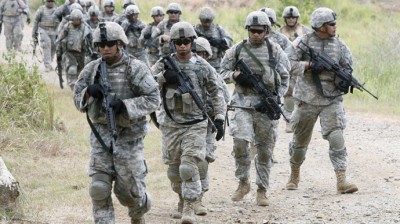US Seeks to Extend Military Presence in Iraq ‘Indefinitely’

Washington will more than double its number of its troops in Iraq as part of the US’ plans for a post-IS vision, a senior Baghdad minister told The New Arab.
US policy makers plan an “indefinite” military presence in Iraq and will double the number of American soldiers in the country to 10,000, a senior Iraqi official said on Saturday.
The reports come amid heated controversy in Baghdad concerning the presence of the US forces in Iraq following the expected defeated of Islamic State group militants.
The US military presence is said to focus on providing combat support and strategic advice to the Iraqi military, as well as overseeing reforms of the Baghdad army, the senior minister in Prime Minister Haider al-Abadi’s government told The New Arab.
“Washington will not extend its presence on Iraqi soil through new military bases, but it will deploy more soldiers to currently existing bases in the capital Baghdad, the Anbar and Nineveh provinces as well as the Kurdistan region,” the minister told The New Arab, speaking on the condition of anonymity.
He said that the increased presence will further focus on securing the porous Iraqi-Syrian border as well as assisting reforms of the Iraqi police and intelligence services.
“The US will also expand its monitoring systems and aerial surveillance as well as partake in securing the Iraqi border with Syria,” the minister said.
The US military presence will allegedly focus on providing combat support and strategic advice to the Iraq military as well as overseeing reforms of the Iraqi army
Despite the presence of US forces being a hugely controversial issue given the experiences since the Anglo-American invasion in 2003, a number of political blocs in the country have welcomed the move, the minister said. The senior minister added that US forces could aid refugees to returning to their homes in regions affected by fighting, as well as “strengthen local police forces and intelligence services in those areas”.
He added that the Iraqi prime minister may not be able to object to US plans given the government’s reliance on US forces in the fight against IS.
“Most political factions – including Sunni, Kurdish, Christian and Turkmen – welcomed US extended presence in Iraq, which they consider to counter Iranian influence in the country,” the minister said.
Abadi cannot reject Washington’s plan because capturing Mosul from IS militants will be impossible without the US-led coalition’s support.
Since June 2014 US military forces have conducted airstrikes against IS in Iraq as part of a US-led coalition, which saw over 5,000 US military personnel gradually sent on “advise and assist” missions to support Iraqi federal and Kurdish Peshmerga forces battling militants.
US special forces are reported to have also conducted ground operations against IS militants with at least American troops reported killed as part of the anti-IS campaign.
Plans for a permanent presence were heavily opposed in 2011, which saw several major Iraqi political parties reject what they termed an “occupation”.
Plans for a permanent presence were heavily opposed in 2011 which saw several major Iraqi political parties reject what they termed would be an occupation
“Washington does not intend to withdraw from Iraq even after the end of IS,” he said, adding that it is “now obvious”.Some political parties are already preparing to oppose the deployment of US troops.
An Iraqi MP from the ruling National Alliance told The New Arab – also speaking on the condition of anonymity – that US aims for a permanent presence will be heavily opposed by the Shia-led bloc.
The lawmaker said that American troops will remain in Iraq under the pretext that the US is “reforming the Iraqi armed forces and local police, or that its presence is needed to maintain stability and ensure that IS cells for not form or that it will help with the reconstruction of the country”.
“The National Alliance rejects US presence in Iraq based on the Iraq-US agreement that saw the withdrawal of American troops from Iraq in 2011,” he said.
Earlier this month, US Defence Secretary Ashton Carter gave insights into US plans for post-IS Iraq.
He said that the US and its international partners will need to remain in Iraq even after the expected defeat of IS in Mosul.
US troops will remain in Iraq under the pretext that they are reforming the Iraqi armed forces and local police
“But there will still be much more to do after that to make sure that, once defeated, ISIL stays defeated,” Carter said using an alternative acronym for IS.
“In Iraq, in particular, it will be necessary for the coalition to provide sustained assistance and carry on our work to train, equip, and support local police, border guards, and other forces to hold areas cleared from ISIL,” said Carter.
The US-Iraqi “Status of the Forces” agreement came to an end on December 31, 2011 and saw the US military withdraw its forces following a nine-year presence that brought down former Iraqi dictator Saddam Hussein in 2003.

